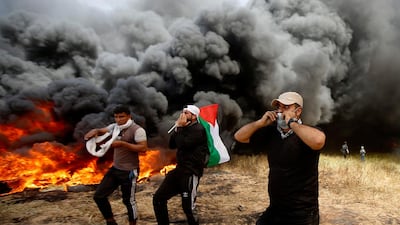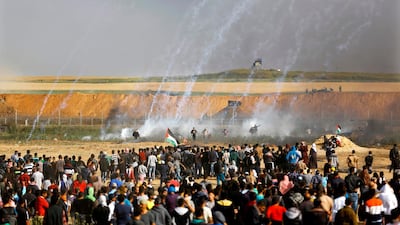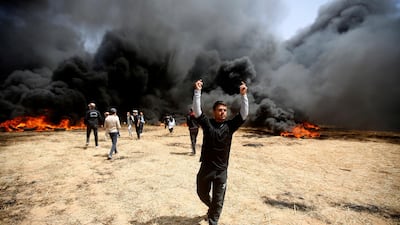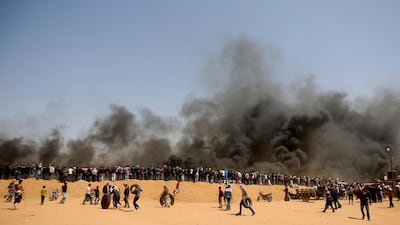Witness accounts of the fatal shooting of a photographer on the Israel-Gaza border on Friday have undermined the Israeli military's assertion that its soldiers do not target Palestinians who pose no threat.
Yasser Murtaja, who died on Saturday of his gunshot wound, was among nine Palestinians killed by Israeli fire during the second consecutive Friday of mass protests on the border. The health ministry in Gaza said another 491 people suffered gunshot wounds.
Among the wounded were five other Palestinian journalists who, like Murtaja, were wearing vests that clearly identified them as press, according to the Palestinian Journalists Syndicate. It accused the army of "deliberate targeting" of journalists.
Murtaja, 30, a cameraman for Ain Media, was covering the protests at Khuzaa, east of Khan Yunis, when he was shot.
Ashraf Abu Amra, a freelance photographer who was with Murtaja, told The National that the two took pictures of Friday prayers at Al Awda, one of five protest camps set up along the border.
"After a half hour there were a lot of burning tyres, smoke swirling and dust," Abu Amra said. "The army started shooting. We saw people falling on the ground."
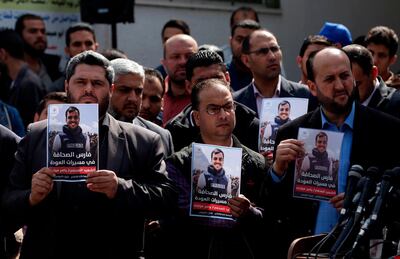
Murtaja was 10 metres away from him and they were between 150 and 220 metres from the border fence, he said.
"Then I saw him, his face to the ground and a pool of blood underneath him. His helmet was thrown away. I collected his camera and his equipment and I saw medics arrived. They tried to give him first aid and blow air into his mouth."
Hundreds of people turned out for Murtaja's funeral in Gaza City on Saturday. He left behind a wife and a two-year-old son.
His death brought to 31 the number of Palestinians killed since March 30, when the protest campaign known as the Great March of Return was launched near the Israel-Gaza border. More than 750 were injured during the first protest.
No Israeli soldier has been wounded in the demonstrations so far.
_______________
Editorial: Israel is plumbing new lows of brutality
_______________
An estimated 20,000 Gazans turned out for the second Friday of protests in what is planned as a six-week demonstration to highlight the demand of Palestinians to return to the homes they or their forebears lost when they were expelled from or fled during Israel's creation in 1948.
While most of the protests were peaceful, groups of young men approached the border fence and threw stones and petrol bombs. Heavy smoke billowed from tyres they had set alight to provide a smokescreen from Israeli snipers.
The army denies using excessive force, saying it is fulfilling its mission to thwart infiltrations and protect Israeli border communities by using "warnings, riot dispersal and as a last resort live rounds in a precise, measured way".
But Abu Amra said another colleague, Ahmad Muamar, was shot in the same spot as Murtaja during the protests on March 30, though not fatally.
"The Israeli snipers can see us clearly because they are in a higher position," he said. "The Israelis are deliberately shooting at the photographers because we are documenting the crimes of the occupation."
The Israeli army said it "does not intentionally target journalists".
"The circumstances in which journalists were allegedly hit by IDF fire are not familiar to the IDF and are being looked into," it said.
The Israeli human rights group B'Tselem, which had called on soldiers to disobey orders to shoot ahead of Friday's demonstration, said that "yet again, the Israeli military used lethal force without justification".
"Shooting live ammunition at unarmed protesters who pose no threat is immoral and a command ordering it is manifestly illegal. Israeli policymakers must change these orders immediately," the group said.
Donald Macintyre, the author of Gaza: Preparing for Dawn, said: "These are unarmed protests and that's what people have been urging the Palestinians to do.
"If unarmed demonstrators continue to be killed by live fire, the international community has a responsibility to act and respond because this is what they have urged on the Palestinians. Whether it will is another question. There has been precious little sign of it so far."
Ghassan Khatib, a former Palestinian Authority minister, was doubtful that the demonstrations would change much.
"They are not leading anywhere and won't shake up the status quo. They've generated some sympathy with Gaza and strengthened a bit the position of Hamas in the short term. But the international community is not in a position to put pressure on Israel to change its position."
